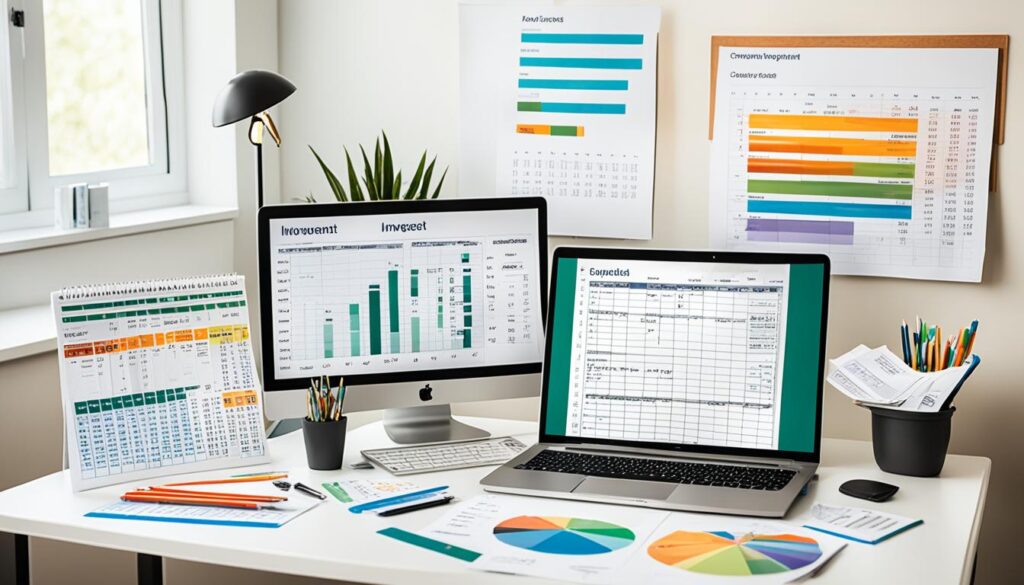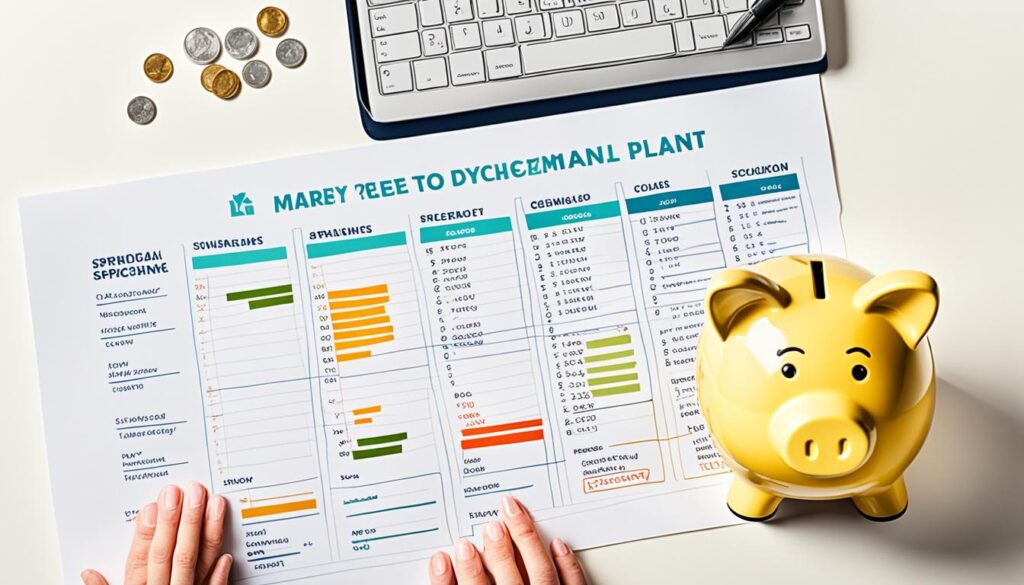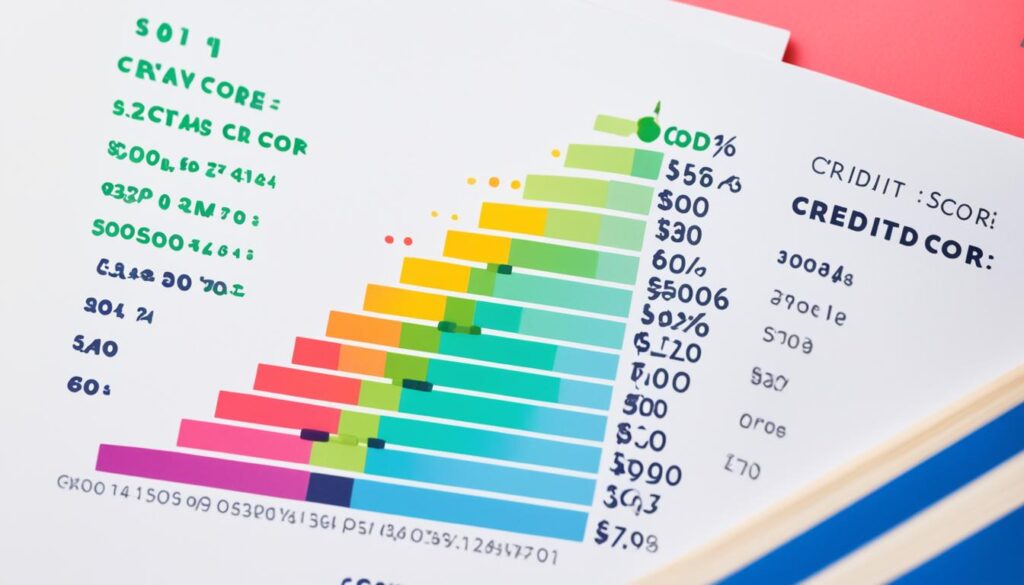Handling your money as a beginner can seem tough. But don’t worry! We have prepared 15 vital personal finance tips for you. These tips are designed to help you budget, save, invest, or just get better at managing money. By following them, you will gain control over your finances and pave the way for a secure future.

Key Takeaways:
- Start with a clear vision of your financial goals
- Track your expenses to create an effective budget
- Understand your net income and automate your savings
- Calculate your fixed burn rate to create stability
- Use multiple bank accounts to manage your budget
Start with the End in Mind
When planning your finances, think of your final goals first. Picture the life you wish for. Do you want early retirement, a new home, or to travel the globe? Knowing what you want helps create a financial plan that matches your dreams.
Maybe you’re working toward wealth, financial freedom, or just a cozy life. Your goals will steer your money choices and shape your plan.
“The future belongs to those who believe in the beauty of their dreams.” – Eleanor Roosevelt
Seeing your financial future clearly gives you purpose. It drives you to make changes and sacrifices to reach your aims. It allows you to manage your spending, save wisely, and make smart choices about investments and debts.
Starting with your end goal sets you on the road to financial well-being and the life you dream about.
Know Where Your Money Goes
Understanding where your money goes is key to a solid financial plan. Tracking your expenses lets you create a budget. This budget helps you manage your money better and reach your financial dreams.
Technology can make tracking your spending much easier. Use a debit or credit card for purchases to get a digital record of your transactions. This helps you keep your expenses organized and easy to review.
There are many budgeting apps and software that can simplify this process. These tools let you sort your expenses, set spending limits, and alert you when you’re close to exceeding your budget in a category.
Making a budget doesn’t mean you can’t enjoy life. It means being smart about where your money goes. Tracking where your money goes can reveal where you’re spending too much. It also helps you find ways to save.
“A budget is telling your money where to go instead of wondering where it went.” – Dave Ramsey
Expense Tracking Tips:
- Regularly review your transactions to ensure accuracy.
- Separate your expenses into categories, such as housing, transportation, groceries, entertainment, etc.
- Set realistic spending limits for each category based on your income and financial goals.
- Track both fixed expenses (such as rent or mortgage payments) and variable expenses (such as dining out or shopping).
- Use a spreadsheet or budgeting app to easily record and analyze your expenses.
By being aware of where your money goes, you can make better spending decisions and secure your financial future. Tracking your expenses is a crucial part of budgeting and planning your finances.
![]()
Determine Your Net Income
Managing your finances starts with knowing your net income. This is your money after taxes and savings from your gross income. You use it for daily costs, saving for the future, and reaching your goals.
Saving at least 15% of your income is advisable. This helps build a safety net and grows your wealth. Put your savings in various accounts like taxable, tax-deferred, and tax-free to enhance your strategy.

Using automatic savings is smart. Setting up auto transfers to savings or retirement accounts is a good step. It keeps you from spending the saving money and keeps you aimed at your goals.
“Saving should become a regular habit to secure your financial future.”
Knowing your net income, saving a bit of it, and using automation helps set a financial base. This leads to a comfy retirement. Taking charge of your net income is key to financial freedom and your big financial goals.
Know Your Fixed Burn Rate to the Penny
Understanding your fixed costs is key for budgeting and keeping financial stress at bay. Fixed costs are your regular monthly expenses. They include things like rent or mortgage, utilities, insurance, and subscriptions. Knowing these expenses helps you make a budget that fits your income.
To figure out your fixed burn rate, list all your recurring expenses and their amounts. Make sure to include even small ones. They can add up. Use your online bank statements and bills to ensure you’re accurate.
After listing everything, add up your fixed expenses. This sum is what you need to set aside each month for these costs. Knowing this number helps you plan how to use your income wisely.
“Knowing your fixed burn rate is like having a financial compass. It guides you in making informed decisions about your expenses and ensures that you are living within your means.”
Building a budget around your fixed burn rate promotes financial health. It lets you set realistic goals and make smart choices about saving and spending. By understanding your fixed costs, you can allocate money confidently to other important areas. Examples include paying off debt, saving for emergencies, and planning for retirement.
It’s vital to regularly check and update your fixed burn rate. Changes like moving or cancelling subscriptions can affect your expenses. By keeping an eye on your budget, you can ensure it stays relevant to your current financial situation.
Why Knowing Your Fixed Burn Rate Matters
Understanding your fixed burn rate offers several advantages:
- Budgeting: It lets you create a budget that truly reflects your income and spending. This prevents overspending and helps you meet your essential needs.
- Financial Stability: With a plan for your fixed expenses, you can aim for a secure financial future. This means saving for emergencies and long-term goals like retirement or buying a home.
In summary, understanding your fixed burn rate is crucial for smart budgeting and financial well-being. By knowing your recurring expenses and matching them with your income, you can manage your money confidently and aim for your financial dreams.

Use Multiple Bank Accounts
It’s easier to manage your budget with multiple bank accounts. You can set up different accounts for each part of your budget. This way, you keep expenses in order and track your budget easily without complex math.
Organization is key in budgeting. By having separate accounts for things like rent, groceries, and fun, you can watch your spending better. This method gives you a clear view of where your money goes. It helps you stay on track with your financial goals.
For instance, imagine having one account for fixed costs like rent and another for fun spending. This separation lets you manage your money better and avoid wasting it on things you don’t need.

Using multiple accounts also improves how you track savings goals. You can have a special savings account where part of your income goes each month. Seeing your savings increase motivates you to keep going.
Besides better budgeting, multiple accounts make it easy to analyze spending. Most banks offer online or mobile apps. These tools let you track your expenses and spot areas for improvement.
| Benefits of Using Multiple Bank Accounts for Budgeting |
|---|
| Enhanced budgeting and organization |
| Clear overview of spending in each category |
| Control over discretionary spending |
| Monitor progress towards savings goals |
| Easy tracking and analysis of expenses |
By using multiple bank accounts, you can simplify your budgeting and better manage your finances. Try it out to see how it can assist in reaching your financial goals.
Make Monthly Deposits into an Investment Account
When it comes to budgeting and securing your future, consider more than just savings accounts. Making monthly deposits into an investment account is key. This way, you can grow your wealth and avoid spending your funds unwisely.
Savings accounts are safe but offer little in return. Investing, on the other hand, lets your money grow for you. By regularly adding money to your investment account, you’re working towards your future stability.
You don’t need to be rich or an expert to start investing. Online platforms and robo-advisors make it easy for beginners. They provide diverse portfolios based on your financial goals and how much risk you can take.
However, before you invest, do your homework and talk to financial experts. Think about how much risk you can handle, your goals, and when you’ll need the money. By doing this, you can create an investing plan that fits your budget and future needs.
Investing is a marathon, not a sprint. Keep up with your monthly contributions and don’t make sudden moves based on market changes. With discipline and patience, you can build a portfolio that secures your financial future.

Reach Out to Your Network
Managing your finances well is all about networking. Your network can give you great financial advice and resources. Many experts are happy to share the tools they used at the start.
Reach out to the pros in your network. Use the connections you’ve made. You can learn a lot from their experiences, good and bad. Their advice can help you make smart choices and avoid finance mistakes.
Templates and Tools
Templates and tools from your network are key for managing money. They can be anything from budgeting templates to retirement tools. These resources make starting easier.
Using these, you can make your money management smoother. They help you stay organized and reach your financial goals. It’s easier to focus on what you want to achieve.
“Networking isn’t just for jobs. It’s about making connections that help both sides. Don’t be scared to ask for help. You’ll find people are eager to share what they know.”
Having a network of finance experts is very helpful. The connections you make now can help you for years. You’ll have support as you face different money challenges and goals.

Networking and advice are vital, no matter your financial stage. By using your network and their tools, you can improve your finance skills. This will help you reach your money goals confidently.
Pay Yourself First
Saving first is vital for good financial health. You do this by putting part of every paycheck into savings. This way, you ensure money goes to your future before other spending.
This habit helps you live within your means. It leads to a healthier and more sustainable financial life.
“By paying yourself first, you are making a conscious decision to prioritize your future financial goals and aspirations. It demonstrates a commitment to your own financial well-being and sets the stage for long-term financial stability.”
Paying yourself first creates a savings cushion. You can use it for emergencies, a house down payment, or retirement. This prepares you for unplanned expenses or future goals.
A special savings account helps you see your progress. It’s rewarding to watch your savings increase. This motivates you to keep going.
Paying yourself first also brings financial discipline. It forces you to budget and live within your limits. You save a portion of your income right away. This decreases the chance of unnecessary spending and promotes wise financial choices.
Starting small matters more than not starting. Even saving a little from your paycheck is a good step. Over time, you can save more and watch your savings grow.
Let’s look at an example of paying yourself first.
| Monthly Income | Savings Rate | Savings Amount |
|---|---|---|
| $3,000 | 10% | $300 |
| $4,500 | 15% | $675 |
| $6,000 | 20% | $1,200 |
The table shows incomes and savings rates. As income grows, so should savings. This strategy boosts your savings and financial security.

Check Your Credit Score
Before taking big financial steps, it’s key to check your credit score regularly. Your credit score is important as it decides the credit and rates you get. Knowing your score helps you make smart choices like consolidating debt or getting new credit.
Your credit score is a number showing how reliable you are financially. Lenders and even employers look at it. A higher score means you’re likely to get better loans and credit card deals.
Checking your score regularly helps you understand your financial status. Think of it as a financial check-up. By looking at your credit report, you can spot and fix errors. This can improve your score and get you better rates in the future.
To check your score, you can use online tools from agencies like Experian, Equifax, or TransUnion. They look at your credit history and calculate your score. They consider your payment habits, how much credit you use, and more.
Keeping an eye on your credit score shows you where you can improve. To boost your score, pay bills on time, keep debt low, and have a good credit history. This can help you get better rates and save money.
Remember, knowing your credit score is powerful. It lets you make smart financial choices and negotiate better deals. Checking your score often can help you stay ahead financially.

Use Available Resources and Take Micro-Steps
Managing your money wisely is key. Make sure to use financial planning resources at your disposal. Many financial institutions offer free tools for budgeting that can jump-start your financial plans. These tools help you understand how you spend your money and track your financial goals.
Taking micro-steps is also vital for financial improvement. Begin by automating your savings. This means setting up automatic transfers to your savings account to save money without thinking about it every month. You can also slightly increase your retirement contributions at work. Even a small bump up can make a big difference in the future.
To succeed financially, you need patience and persistence. Use the tools and resources available, and take small steps that you can manage. Starting today can lead you to a brighter financial future. It’s all about taking action now.